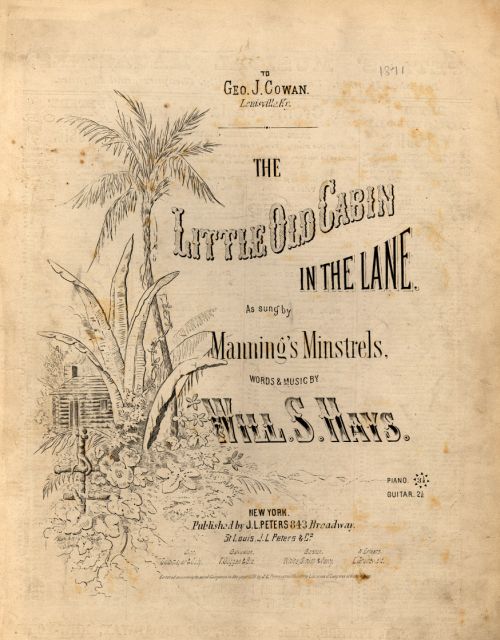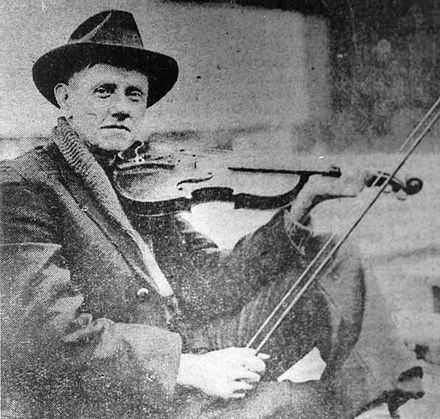Whitewash: The true “race music” begins
Despite the influence the musicians above, and others, would and did have on the emergent country music scene - and even on Appalachian music itself - they would be allowed, read forced, to fade into the background when it came time to record this music and introduce it to the world outside. The very first true “country music” record would, you will be not at all surprised to hear, be recorded by a white man, but, you might be shocked (or not) to learn, would turn out to be an old tune romanticising slavery.

 Fiddlin’ John Carson (1868 - 1949)
Fiddlin’ John Carson (1868 - 1949)
There’s a lot not to like about Carson, despite his place in country music history, or perhaps because of it. A native of Georgia, he learned to play the fiddle when young and worked as foreman on a cotton mill in Atlanta. When the workers were on strike for better pay he took to playing his fiddle on street corners in order to make ends meet. He wrote songs and published and sold them for a nickel or a dime. One song he wrote strongly criticised the governor of Atlanta for commuting the death sentence of a Jewish man, Leo Frank, wrongly accused of murdering a little girl, Mary Phagan. You can’t say in fairness that his song was entirely responsible for what happened, but given that it had the kind of baseless accusations of bribery and collusion that would have made a Trump supporter proud, it surely contributed to the later illegal capture of the man from jail and his subsequent lynching by a mob. Carson is also said to have written, though not released, a song praising the tree from which Frank was hanged.
As his fame began to grow - he was crowned “Champion Fiddler of Georgia” no less than seven times between 1914 and 1922 - he began to cozy up to local politicians, playing at their campaign rallies and endorsing them, and writing songs for them. He appeared on radio for the first time in 1922, on Georgia’s WSB (which I’ve learned from Ken Burns’ documentary stands for Welcome South Brother. Probably would be more accurate had they called the station WSBALAYNB, or if the welcome was changed to white) where he was a huge hit and it was not long before a recording career followed. However before we go there, a short diversion is required to explain the lay of the land at that time.

Two major innovations - perhaps the two biggest in all of its history - took place in music as the nineteenth century spilled over into the twentieth. In 1877 the inventor of everything it seemed from the light bulb to electricity itself, Thomas Edison, unveiled the world’s first machine capable of reproducing sound, which he called the phonograph. However, as astute as he may have been, he missed the boat bigtime with this one, and did nothing much really with it, other than patenting the device, until Alexander Graham-Bell, his first cousin Chichester and Charles Sumner Tainter improved on it in 1886, replacing Edison’s tinfoil-covered cylinders with wax-coated ones, and changing the name of their machine to the graphophone. Almost, guys, almost! But it was Emile Berliner who perfected the name we know today a year later, patenting his gramophone.
Indeed, it was he who made the, in retrospect, ground-breaking change from rotating cylinders to flat discs, the ancient precursors of what we used to know as records, and which survive today as CDs and DVDs. By the early half of the first decade of the twentieth century these were selling well, as people bought “records” or recordings of opera singers like Enrico Caruso, classical composers and marching tunes, orchestral jazz and the showtune music of “blackface” performers such as Al Jolson. The advent of the gramophone of course created a whole new industry, the music recording industry, and profits rolled in.

But there was a storm coming on the horizon, and it was called radio, or wireless transmission.
The first commercial radio station in the USA went live in 1916 and by 1920 radio stations were popping up all over the country, as well as all over the world. As portable transistor radios began to appear for sale in shops, easily affordable, they began to take a large bite out of the revenues of record companies. After all, why pay for something you could get for free, once you’d made the initial outlay on the radio? But radio stations, like the record companies, broadcast the same basic fare - orchestral concerts, operas, marching bands, and so on. The record companies needed to look to niche markets which the radio did not service, and they found them in rural America.
With what we would today find as a shocking lack of taste (but to be fair, complete honesty, even if that honesty was accidental and brutal) one of these markets, catering to black listeners, gained the descriptor of “race records” and was, in essence, the forerunner of soul, Motown and jazz. The other side of the coin was the rural white audience, who were not about to listen to a bunch of “savages” chanting their African nonsense, singing about things no God-fearing Christian should be singing! Oh no. These folks wanted clean, wholesome, family music - gospel tunes, old time music, nostalgia, music that took them back to a - mostly imagined - better time, a simpler time. This would be performed almost exclusively by people of their own colour, and would of course come to be known as …
… hillbilly music?
Oh yeah. It was some time before the words country and music were put together, and a long time after that before they’d acquire the suffix western. This was music from the mountains, from the hills. A sort of wild, untamed (but safe, as it was white) exuberant form of music which sang of the normal things normal folks did, such as ranching, ploughing, dancing, and of course drinking and loving. Simple songs for simple people. Hillbillies. And so the music was called, for some time, hillbilly music.
This didn’t go down well with either its practitioners or those who lived in the mountains, who felt (rightly) that they were being denigrated, looked down upon, laughed at jeered at and pitied. Variety magazine even described them thus:
“95% can neither read nor write English. Theirs is a community all unto themselves. Illiterate and ignorant, with the intelligence of morons.” Nice. The people who bought the records, as they became available, didn’t mind listening to the music, but would have been horrified to have been associated with these “poor mountain cousins” of theirs, even though their characterisation of them was completely off base. But who needs the truth when you want to be entertained, huh?
In some ways, mountain folk or hill folk or hillbillies, or whatever you want to call them (or they wanted to be called) didn’t quite help this skewed perception of themselves by the outside world as they participated in travelling medicine shows, where a quack would attempt to sell worthless waters and concoctions as elixirs for everything from a bad back to the secret of eternal youth, maybe. Fiddle and banjo players would work up the crowd by playing against this backdrop of the peddling of snake oil, this idea carried through to its natural conclusion with the arrival of radio, where on Kansas’s KFKB Dr. John R. Brinkley had the crazy idea of - wait for this - implanting goat testicles into humans to restore sexual potency. In order to promote his product he would feature music by local fiddlers. Pretty apt maybe, as he was undoubtedly on the fiddle himself. In neighbouring Shenandoah, two competing radio stations staged fiddle contests, which drew large crowds who wanted to watch the live broadcast, and the town grew in response to the demand. Well, it wouldn’t have happened in New York.
The first radio station to be set up in what would become in time country music’s mecca, Nashville, Tennessee, was, you might be surprised to learn, a marketing ploy to sell insurance. It was in fact set up by an insurance company, the National Life and Accident Insurance Company, broadcasting live music in order to sell their product. Not quite the kind of genesis you’d have liked for Nashville, eh? The big lie, as it were, or hypocrisy if you prefer, is that the station’s boss required any acts that played on his radio show to have a hillbilly-inspired name, even if they were nothing to do with the mountains. If they came from Chicago or Boston, or New York or Washington, it didn’t matter. They had to sound authentic. Hillbilly music was what was in vogue, was what the listeners wanted to hear, and this station would deliver what the people wanted, all in the name of selling insurance. How’s that for good old boys, eh?